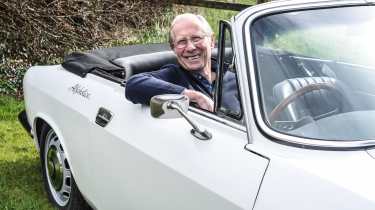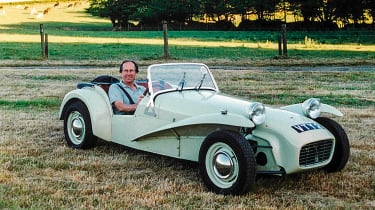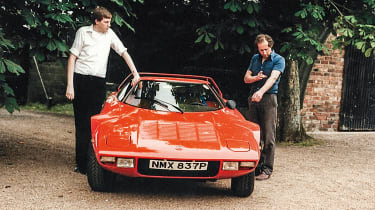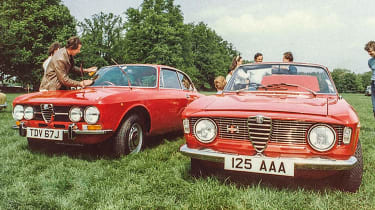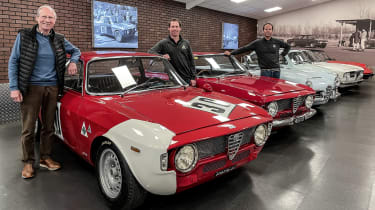My Life & Cars – Richard Banks, Alfa Romeo fettler and Alfaholics founder
Alfaholics’ brilliant GTA-R was one of the first examples of the global phenomenon that is the restomod. We meet the man who built the company
When children arrive on the scene, many of us are forced to swap our toys for the practical implements of family life. Out with the indulgent two-seater coupe, in with the sensible estate. Richard Banks, now co-owner of Alfaholics, the Alfa Romeo restorer and tuner, did things differently. With the pitter-patter of tiny feet imminent, he bought a sports car and then kept buying more.
‘Having for years existed hand-to-mouth on motorsport sponsorship, in 1977 I moved from London to the Cambridgeshire fens to start a family,’ Banks explains. ‘Whilst considering what to do for work, I came across a very nice, low-mileage Alfa Romeo 2000 GTV which had been stolen and recovered and had ended up in a nearby scrapyard. It required minor mechanical work and repainting, and when it was completed I drove it down to Exmoor with my heavily pregnant wife to show her my old haunts on Exmoor.
‘I just loved the way that car drove with its superb handling, not too much grip on those 165 HR 14 tyres, but pin-sharp steering and wonderful high-speed stability. Such fun.
‘Of course, I was in no position to keep the car – I needed the money. So I advertised it in Exchange & Mart and by 9am on the Thursday when it came out, I had an Alfa Romeo enthusiast on the phone wanting to buy it. By the day’s end I knew that this would be my new business: RW Banks Alfa Romeo Specialist came into being.’
Although his name is now synonymous with Alfas, Banks’s earliest automotive aspiration was for a car produced closer to home. ‘My interest in cars was sparked whilst travelling in my parents’ 1958 Land Rover when we were overtaken by what I later found out to be a Mk1 Lotus Seven. I was smitten and there and then decided that that was the car I was going to own. This eventually became a reality in 1965 – returning from a one-year posting to New York, the bank I was employed by granted me a handsome bonus. Otherwise I would still have been taking a Green Line bus to Brands Hatch or a train to Crystal Palace to watch my hero Jim Clark.
‘My Seven was a 1962 model with a 1340cc Cosworth engine and a close-ratio ’box – pretty much unbeatable on London streets as well as the pre-motorway roads of the ’60s before any serious traffic came along to spoil things. Sadly, I was forced to sell it when I went to work for a chum and needed to carry samples to meetings. I exchanged the Seven for a Nathan-tuned Hillman Imp, soon followed by a couple of Mini Coopers and then an innocuous-looking road rally-prepared Mk1 Cortina GT with a 1650cc engine and a limited-slip diff, which crushed many an ego.
‘Fortunately, my boss was a petrolhead and I was able to enjoy generous use of his early drophead E-type, Marcos and then, when the office moved out of London to Reading, a Gordon Keeble, which was a bit of a beast but great fun. At this time I managed to find an Elva Courier with 1622cc MGA power. This was extremely entertaining to drive, a poor man’s Elan really. In Reading I met a couple of chaps with a garage who were rallying a Cooper S quite successfully at club level, taking it in turns to drive. We ended up doing the Welsh and RAC rallies before buying a full race Cooper S.’
By this stage, the early 1970s, Banks was dabbling in motorsport sponsorship. ‘Through Mini racing I met the very talented Richard Longman. I managed to find sponsorship to run a works-assisted Formula 3 Lotus 69 for Richard, but we were underfunded. We managed a 2nd place at Thruxton but were usually midfield. The car was written off in the rain at the end-of-season Snetterton meeting. Future world champions James Hunt, Jody Scheckter and Alan Jones were all competing in that ’72 season: Formula 3 was certainly competitive back then.
‘In my constant hunt for sponsors I found White Horse Whisky, who entrusted me with handling all their sports sponsorships. This began with promoting their Group 1 Hillman Avenger GT, very ably driven by Gavin Waugh on British rally championship events. Later that year White Horse decided to sponsor Andrew Cowan and Johnstone Syer in a works-built Escort RS2000 on the 1974 World Cup Rally. What should have been a winning combination fell apart when the back axle failed in the Algerian desert: they finally finished 15th.
‘My next excitement was handling general publicity for The Chequered Flag garage. I put forward a case to owner Graham Warner for publicising his Lancia dealership with a Group 4 Stratos in major UK rallies. He bought the works car that had crashed on that year’s Monte and hired Ron Pellat, an F1 mechanic, to maintain it. Ron was dispatched to Turin to rebuild the car there and learn its complexities. I went out later to go through the programme with Lancia’s rally boss, Cesare Fiorio, and was delighted to meet Mike Parkes, who had left Ferrari and was responsible for Stratos development. The Stratos broke down too often to achieve serious results, but it did garner plenty of publicity for The Flag.’
Banks’s next sponsorship deal was to kindle his passion for Alfa. ‘Both the BARC and BRSCC had introduced production saloon car championships and I persuaded Trustee Savings Bank to run HPC instructor John Lyon in an Escort Sport. After a couple of decent seasons contesting both championships, and thanks to John’s wife working for Worth Perfumes, I secured a budget to run a 2-litre Alfetta GTV in Monsieur Worth colours and thus began my love affair with Alfa Romeo. Worth promised us a second season provided we won the championship. Sadly, we finished second.
‘We ran the car again in 1978 as part of the Alfa Romeo Dealer Team with Jon Dooley driving and had another excellent year, although Gerry Marshall in a Dolomite Sprint proved a bit too fast, leaving us runners-up in the 1600-2000 class.’
With a young child at home now, Banks shifted focus to his new career as Alfa fettler. ‘With the help of my wife I built a three-car garage/workshop brick by brick in our back garden. And then we earned our living from it – a real partnership. Thanks to having a fine mechanical and welding workshop and an exceptional paint shop run by MGA racer Neil Cawthorn in the next town, I was able to take cars to pieces and then carefully build them up again with any new parts that were needed and give them a proper service, ready to sell.
‘Unsurprisingly, red 2000 GTVs were the best sellers and red Spiders were never around for long. Many thought its longer wheelbase made the Giulia Super saloon the sweetest handling of the 105 range, but their boxy looks put many would-be Alfa owners off. I loved them and enjoyed one for many years, not only doing towing duties but also the school run as well as family holidays to Italy. Early on I found a Giulia GTC requiring total restoration at a USAF base in Suffolk – it was a small production run of the coupe with the top removed by Touring. Very elegant and with the mechanics from a 2000 GTV implanted was more than a match for a 1600 Golf GTI. Today it might be called a restomod, though hardly what my sons are producing at Alfaholics today.
‘In the early ’80s I moved near to Newmarket and was eventually able to garage 15 cars around the courtyard of our house, an old village shop. At this stage I received a letter from a young Italian student offering to find Alfas for me to buy. Thus began four or five years of monthly flights to Rome followed by non-stop drives back to Suffolk in a variety of well-used Alfas, as well as Fiat Dino coupes and Spiders.
‘Some cars I was lucky to reach home in and a few I retrieved with one of a series of Citroën CX estates and trailer – those big Citroëns were fantastic tow cars with phenomenal load capacity thanks to their size and ingenious suspension. Nothing else came close. When eventually I ran out of CXs I bought an XM, stupidly changing it for a Mercedes E-class estate. I did manage to clock up 230,000 miles in the unreliable, rusting W210 including a 2500-mile three-day dash to Sweden with a trailer to collect an ex-Autodelta 1600 GTA that had lived there since being used mainly by Jochen Rindt in the 1966 European Touring Car Championship.
‘During the ’80s and ’90s I always strove to have something Italian and non-Alfa to enjoy on a sunny day. Some that come to mind include a 3-litre Lamborghini Urraco that was lovely to behold and made great music, but somehow I always felt vulnerable driving. A Maserati 3500 GT Vignale Spider, one of the five or so right-hookers, I completely restored and enjoyed for a number of years and is the car I most regret selling. Other Maseratis include a 4-litre aluminium-bodied Mistral; Mk1 and Mk2 Sebrings and a Khamsin, which I loved. I had a Ferrari 308 GTS at the same time, one of the very few Ferraris I have owned, but it felt too tame after the Khamsin.
‘One car that never felt tame enough was a road-going Stratos – the suspension hadn’t been set up properly and it was a bit of a beast. Then I had a real midlife crisis and bought a derelict S2 Lotus Seven and had it restored. I kept it several years then replaced it with an early Elise. But I soon realised I was from the pre-mid-engine-car era. Too many years enjoying 105-series Alfas with an excess of handling over grip; cars that sent early messages of impending loss of grip that made opposite-lock motoring so effortless.
‘Having moved to Devon in the early ’90s, when classics were in the doldrums, I realised I needed to change tack. With a shed full of new and used parts and project cars, it seemed logical to use my hard-earned experience to create what I felt could be an exciting Alfa Romeo parts business. Thus in 1999 Alfaholics was formed, offering a full range of parts for Giulia models from 1963 to 1978, including Spiders up to 1994, with the addition of a range of performance upgrades.
‘I’d been running a Formula Ford for my elder son Andrew to race, so switching to an Alfa 105 coupe, initially in the AROC Championship and then the GTA Challenge, was perfect for publicity as well as a means of developing a range of performance parts.
‘Things really took off after my sons Max and Andrew joined the business and we moved to a modern unit near Bristol. Mail order parts have always been our bread and butter, but the subsequent purchase of a further two units allowed us to set up a large workshop to build the Alfaholics GTA-R restomod, as well as develop and manufacture the complete range of parts that this would require. There was also room for a small race shop, which enabled us to run a 1600 FIA GTA in International Under 2-litre Touring Car races, a series Andrew and Max won in 2017.
‘Alfaholics has played a significant part in creating the current popularity of the restomod with the GTA-R and offers a range of parts and parts packages for customers wishing to build or customise their own car.
‘Nowadays I enjoy a Jaguar XF as rapid, comfortable, daily transport. And for sunny days I have a Porsche 987 Gen 2 PDK Boxster, which I like to think of as an old man’s Elise. And, of course, I still have my beloved GTC, which I pulled out of a Plymouth doctor’s orchard in 1985, for a warm sunny day’s picnic on Exmoor!’
This story was first featured in evo issue 299.
